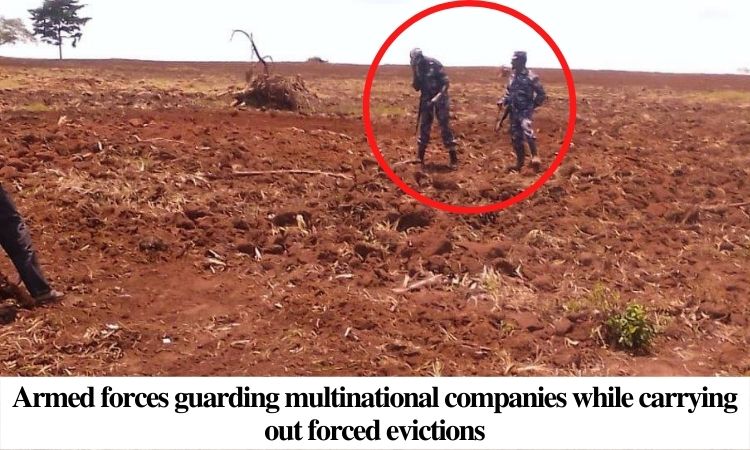By Witness Radio Team.
In our breaking article published last week, Witness Radio and its contributors based on their data indicated that evictions rose during their suspension. According to the data, over 300,000 people’s livelihood was at stake as their land was on the verge of being grabbed. However, the new findings by the team reveal that 50,000 Ugandans were evicted. The evictions left the communities impoverished, homeless, hungry, disintegrated, and lost their livelihood.
Recently Witness Radio’s suspension was lifted as the National Bureau of non-government organizations licensed it to operate as a non-governmental organization. However, one of the chilling evictions transpired in Nyamutende and Kikungulu villages around the 3rd of September 2021. Over 20 residents slept in the cold after they were evicted at gunpoint by a multinational, Kiryandongo Sugar Company Limited.
“The soldiers guarding the company come from nowhere, they were tough and did not talk to us but only destroyed everything they found,” Mr. Olupot James, one of the evicted residents recounts the ordeal in an interview with Witness Radio.
When the area chairperson Mr. Ochola Charles intervened to stop the evictions, he said he was threatened to be shot at.
“Their manager whom we identified as Peter instructed the soldiers to shoot at me. He argued that I had no reason to stop them from doing what they are doing. But am the area chairperson who has to know what is happening in my community. This is the impunity we are fighting but the companies seem to be protected,” Mr. Ochola wondered.
In Katusiime William’s community, Kisalanda village in Kiryandongo district, his family is among the many that Agilis Company has recently evicted. Katusime who is protected by law as a bona fide occupant was evicted from the land claimed by the company. His family occupied the said land in 1975.
According to Uganda land law, a person who settled and utilized the land unchallenged by the registered owner for twelve years or more before the coming into force of the 1995 Constitution is protected by law as a bona fide occupant.
In an interview we held with him a fortnight back, he said he was attacked by 18 people consisting of 8 armed policemen, 7 private security guards, and 3 government soldiers, who destroyed his cassava plantations and a son’s house. They immediately ordered them to leave their land.
When we contacted Mr. Johny Masagazi, the Corporates Manager for Kiryandongo Sugar and Agilis’ Communications Corporates Manager, Mr. Emmanuel Onyango denied evicting residents.
These systematic and forceful evictions have ravaged smallholder farming communities since the suspension. These evictions have continued in Mubende, Kyankwanzi, Kikuube, and Kiryandongo districts.
In the Mubende district, families continue to be displaced and terrorized by Formosa, a tree planting company accusing them of occupying their land illegally.
According to Witness Radio’s legal officer, Ms. Sarah Adongo, none of the evictions that happened during their suspension was peaceful and neither followed the required legal eviction guidelines.
“In some communities, land rights defenders were kidnapped and whisked away, tortured purposely to instill fear among the people they lead. The evictors always use extreme force that is un-called-for yet eviction directives clearly state that the evictions shall be carried out in a manner that respects the dignity, right to life, property, and security of all persons affected.” She said.
“Persons to be evicted shall be allowed to remove illegal structures and where a person does not comply, the eviction shall be carried out. Evictions should be carried out on weekdays from 8:00 am to 6:00 pm. But cases are seen happening at night without complying with any orders, and particularly without valid legal notices.” She added.
Concerning the forceful evictions, over 60,000 acres of land were grabbed by the big shots in government and local or foreign investors. Research by Witness Radio indicates that most of the grabbed land is used for large-scale commercial agriculture, industrialization, or what the government calls development projects which have disrupted people’s livelihoods.
Katusiime and Olupot’s communities form part of the 50,000 people. Katusiime described the current situation as hell. Mr. Katusime had over 150 acres that were grabbed by the company. “I am useless without my land. I used to provide for my family. We used to eat well”. He grieved.
Currently, 90 community land rights defenders in only four districts namely Kyankwanzi, Mubende, Kikuube, and Kiryandongo are facing unscrupulous charges over multiple resistance to land grabbing.
The Head Legal at Witness Radio, Mrs. Bulyerali Joan, one of the lawyers who were arrested while collecting evidence in Kiryandongo district in 2020 to pin multinational land grab in court said police and army are in bed with the investors to cause fear within the oppressed communities by arresting and charging them.
She noted that the Kiryandongo district is one of the areas where the criminal justice system has been used to kidnap, torture, and arrest land rights defenders, and the main perpetrator is the Uganda Police Force which tortures eviction victims, arbitrarily arrests and dumps them in police cells only to be falsely charged with abusive criminal charges. She added that at the time of the organization’s suspension, the defenders could not be represented in court or while in police cells.
Our attempts to speak to the Uganda Police Force’s spokesperson Fred Enanga on his known contact for comment on the increased arrests were futile since our repeated calls were neither received nor returned by press time.


 NGO WORK2 weeks ago
NGO WORK2 weeks ago
 MEDIA FOR CHANGE NETWORK2 weeks ago
MEDIA FOR CHANGE NETWORK2 weeks ago
 MEDIA FOR CHANGE NETWORK2 weeks ago
MEDIA FOR CHANGE NETWORK2 weeks ago
 MEDIA FOR CHANGE NETWORK2 weeks ago
MEDIA FOR CHANGE NETWORK2 weeks ago
 MEDIA FOR CHANGE NETWORK2 weeks ago
MEDIA FOR CHANGE NETWORK2 weeks ago
 MEDIA FOR CHANGE NETWORK7 days ago
MEDIA FOR CHANGE NETWORK7 days ago
 MEDIA FOR CHANGE NETWORK1 week ago
MEDIA FOR CHANGE NETWORK1 week ago
 MEDIA FOR CHANGE NETWORK2 days ago
MEDIA FOR CHANGE NETWORK2 days ago

























